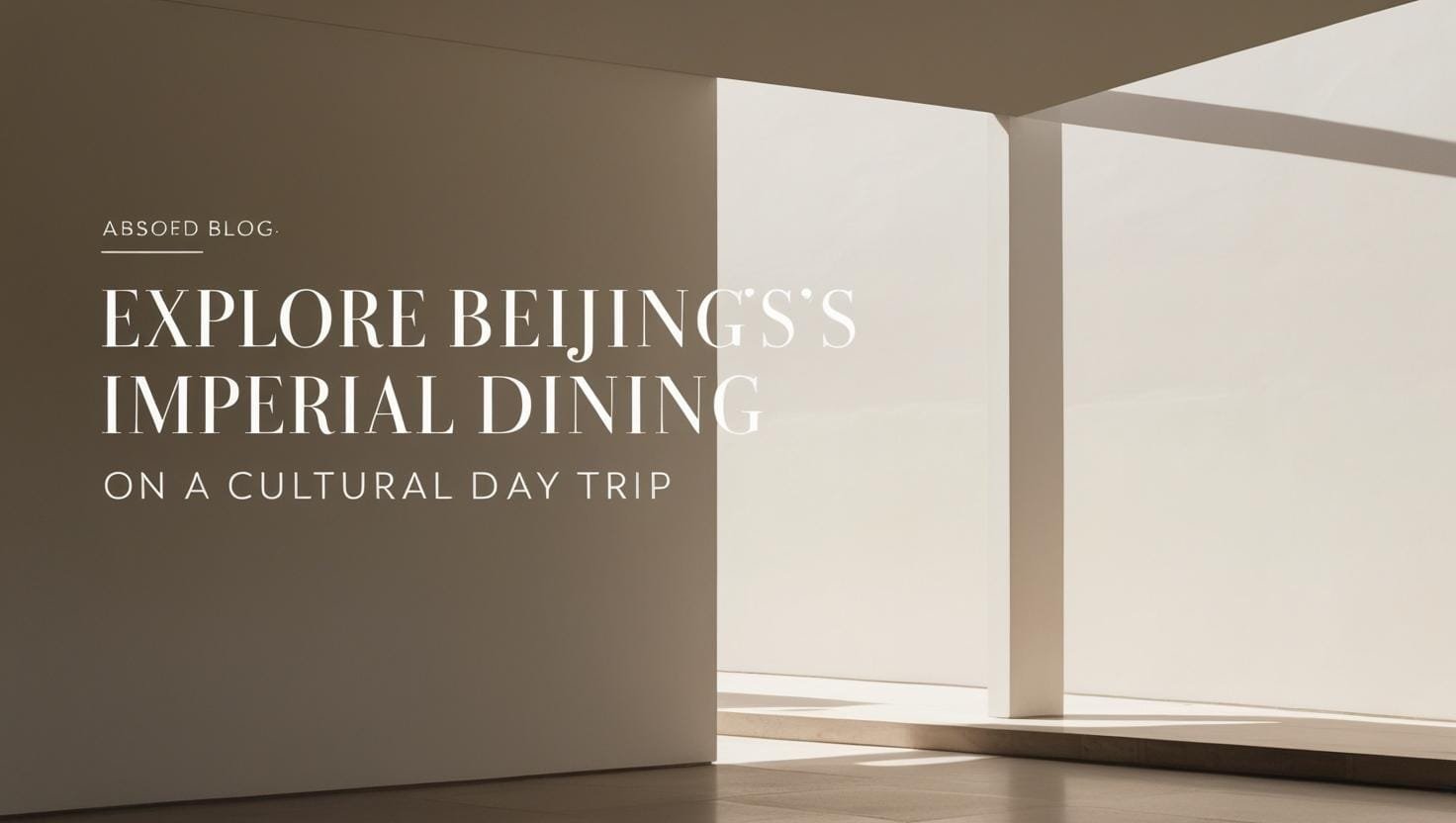“`html
Explore Beijing’s Imperial Dining on a Cultural Day Trip
Discover Beijing’s rich history and culinary heritage with a cultural day trip focused on imperial cuisine. Savor exquisite dishes fit for emperors and explore the cultural landmarks that define this magnificent city.
Introduction: A Taste of Imperial Splendor in Beijing
Welcome to Beijing, a city where ancient history and modern vibrancy blend seamlessly. Here at jusha.travel, we believe that experiencing a culture through its cuisine is an unparalleled journey. What better way to immerse yourself in Beijing’s majestic past than by exploring its imperial dining traditions? This cultural day trip is designed to give you a taste—literally—of the opulent lifestyle once reserved for emperors and their courts. Focusing on Beijing dining, we’ll guide you through an unforgettable experience that combines historical sites with culinary delights, offering a unique perspective on China’s rich heritage. From the meticulously prepared dishes to the stories behind them, get ready for a gastronomic adventure that will transport you back in time.
Section 1: Unveiling the Secrets of Imperial Cuisine
Embark on your Beijing dining adventure by delving into the world of imperial cuisine. This culinary tradition is characterized by its elaborate preparation methods, exquisite ingredients, and presentation fit for royalty. Originating from the kitchens of the Forbidden City, imperial cuisine represents the pinnacle of Chinese gastronomy.
* Historical Context: Understand the origins of imperial cuisine and its significance in Chinese history. Learn how dishes were crafted not only for taste but also for medicinal and symbolic purposes.
* Key Ingredients: Discover the rare and precious ingredients that define imperial cuisine, such as bird’s nest, shark fin, and various medicinal herbs. These ingredients were believed to promote longevity and vitality.
* Preparation Techniques: Explore the intricate cooking techniques employed by imperial chefs, some of which have been passed down through generations. Techniques like precise knife work and slow simmering were essential to creating these culinary masterpieces.
A visit to a renowned Beijing dining establishment specializing in imperial cuisine is a must. Restaurants like Fangshan Restaurant in Beihai Park offer authentic dishes in settings that evoke the grandeur of the Qing Dynasty. Be sure to try signature dishes such as “Phoenix Tail Prawns” and “Deer Sinew,” each with its own unique history and preparation.
Section 2: Crafting Your Day Trip Route: A Blend of History and Flavors
Our suggested day trip route combines historical landmarks with culinary experiences to give you a comprehensive taste of imperial Beijing.
* Morning: The Forbidden City: Begin your day at the Forbidden City, the former imperial palace and a UNESCO World Heritage site. Explore its magnificent halls, courtyards, and gardens, imagining the emperors who once resided here. Allow at least 3-4 hours to fully appreciate this sprawling complex.
* Lunch: Imperial Cuisine at Fangshan Restaurant: After the Forbidden City, head to Beihai Park and indulge in an imperial feast at Fangshan Restaurant. Situated in a picturesque setting, this restaurant offers a truly immersive dining experience. Be sure to book in advance, as it’s a popular spot.
* Afternoon: Temple of Heaven: In the afternoon, visit the Temple of Heaven, where emperors of the Ming and Qing dynasties performed rituals to ensure a good harvest. This serene park offers a peaceful escape from the city’s hustle and bustle.
* Evening: Wangfujing Snack Street (Optional): If you’re still feeling peckish, Wangfujing Snack Street offers a variety of local Beijing snacks. While not strictly imperial, it’s a great way to sample the diverse flavors of the city.
This day trip route is designed to be both educational and delicious, providing a balanced perspective on Beijing’s imperial past.
Section 3: A Cultural Guide to Imperial Dining Etiquette
To fully appreciate your Beijing dining experience, it’s helpful to understand some of the cultural nuances associated with imperial cuisine. Our cultural guide offers insights into dining etiquette and traditions that will enrich your journey.
* Chopstick Etiquette: Mastering chopstick etiquette is essential in any Chinese dining setting. Avoid sticking your chopsticks upright in a bowl of rice, as this resembles incense offerings for the dead.
* Tea Ceremony: Many imperial dining experiences include a traditional tea ceremony. Pay attention to the proper way to hold and sip your tea, and always express gratitude to the person serving you.
* Serving Order: In imperial cuisine, dishes are typically served in a specific order, starting with cold appetizers, followed by hot dishes, and ending with desserts. This order is designed to stimulate the palate and enhance the dining experience.
* Toasting: When toasting, hold your glass lower than the person of higher status as a sign of respect.
Understanding these cultural nuances will not only enhance your Beijing dining experience but also demonstrate your respect for Chinese traditions.
Conclusion: Savoring the Legacy of Beijing’s Imperial Past
Exploring Beijing dining through the lens of imperial cuisine offers a unique and flavorful way to connect with China’s rich history. From the meticulously crafted dishes to the cultural traditions surrounding them, a cultural guide and well-planned day trip route can transform a simple meal into an unforgettable journey. We hope this guide has inspired you to embark on your own culinary adventure in Beijing.
At jusha.travel, we’re passionate about providing you with the best insights and tips for your China travels. Be sure to visit our site for more inspiration and practical advice.
Now, we’d love to hear from you! Have you ever experienced imperial cuisine in Beijing? What were your favorite dishes or cultural insights? Share your thoughts in the comments below, and don’t forget to visit jusha.travel for more exciting China travel content!
“`

